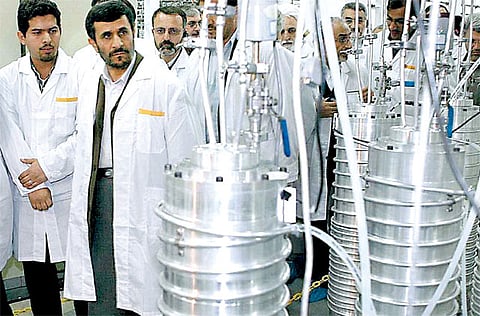Iran, Brazil, Turkey to discuss nuclear fuel swap on Sunday
The foreign ministers of Iran, Brazil and Turkey will meet in Istanbul on Sunday to discuss a nuclear fuel swap proposal they brokered in May, Iran's foreign ministry spokesman said

Tehran: The foreign ministers of Iran, Brazil and Turkey will meet in Istanbul on Sunday to discuss a nuclear fuel swap proposal they brokered in May, Iran's foreign ministry spokesman said.
Iran's Foreign Minister Manouchehr Mottaki will meet with his Brazilian and Turkish counterparts, Celso Amorim and Ahmet Davutoglu, "in Istanbul tomorrow morning to discuss... the Tehran Declaration about the fuel swap," ministry spokesman Ramin Mehmanparast was quoted as saying by Isna news agency.
The Istanbul meeting will be the first between the three sides since the United Nations Security Council imposed a fourth set of sanctions against Iran on June 9 over its controversial nuclear drive.
The May 17 declaration by Iran, Brazil and Turkey stipulates that Tehran would send 1,200 kilogrammes of its low-enriched uranium (LEU) to Turkey, to be supplied at a later date with high-enriched uranium by Russia and France.
It was immediately cold-shouldered by world powers which went ahead and backed the fresh UN sanctions against Iran for refusing to halt its sensitive uranium enrichment programme.
The deal was a counter-proposal by Iran to an October plan drafted by the UN atomic watchdog in Vienna that envisaged sending 1,200 kilogrammes of Iran's LEU in exchange of high-enriched uranium to be used at a Tehran research reactor.
But that plan got caught up in deadlock, with both groups insisting on conditions unacceptable to each other.
The UN's International Atomic Energy Agency drafted its proposal in collaboration with Russia, France and the United States, the trio since known as the Vienna group.
The group raised several questions regarding the Tehran Declaration, and Iran's atomic chief Ali Akbar Salehi said on Saturday that Tehran was prepared to answer them.
"A response has been prepared and in the next two or three days it will be delivered to the Vienna group," Salehi was quoted as saying by ISNA.
He said Iran's response was a "general response, but the technical response to their questions will be discussed probably in a meeting with the Vienna group."
Salehi did not specify when such a meeting between Iran and the other member of the Vienna group would take place.
Sign up for the Daily Briefing
Get the latest news and updates straight to your inbox



